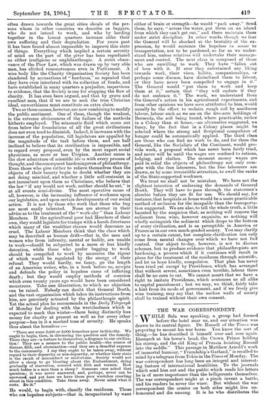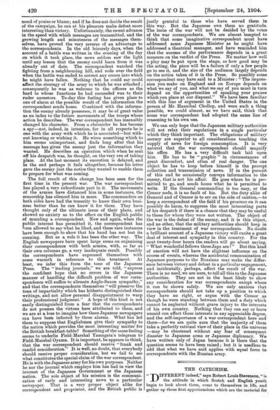meed of praise or blame; and if he does not
decide the result of the campaign, he can at his pleasure make defeat more interesting than victory. Unfortunately, the recent advance in the speed with which messages are transmitted, and the growing length and minuteness of the messages them- selves, have proved the very reverse of an advantage to the correspondents. In the old leisurely days, when the account of a battle was written in the evening of the day on which it took place, the news seldom saw the light until any lesson that the enemy could learn from it was already out of date. The correspondent watched the fighting from a neighbouring hill, and rode over the field when the battle was ended to correct any errors into which he might have fallen. Nothing that he could say could affect the strategy of the army to which he was attached ; consequently he was as welcome to the officers as the bard to whose functions he had succeeded was to their ruder ancestors. To-day this feeling has given place to one of alarm at the possible result of the information the correspondent sends home. Combined with the informa- tion the enemy already possesses, it may be of great value as an index to the future movements of the troops whose action he describes. The war correspondent has insensibly changed his character. From a chronicler he has become a spy—not, indeed, in intention, for in all respects he is one with the army with which he is associated—but with- out knowing or wishing it. He wires something which to him seems unimportant, and finds long after that his message has given the enemy just the information they wanted. He describes an operation which when he sent off his despatch was, he thought, on the very eve of taking place. At the last moment its execution is delayed, and in the end perhaps it fails altogether, because his letter gave the enemy just the notice they wanted to enable them to prepare for what was coming.
The full result of this change has been seen for the first time in the present war. The war correspondent has played a very subordinate part in it. The movements of the armies have distanced him in some instances, the censorship has silenced him in more. The commanders on both sides have had the temerity to know their own busi- ness better than he can know it for them. They have thought only of the ultimate issue of their plans, and showed no anxiety as to the effect on the English public of muzzling a correspondent. Now and again, when the public interest has permitted it, the correspondent has been allowed to say what he liked, and these rare instances have been enough to show that his hand has not lost its cunning. But as a rule it has been the other way. The English newspapers have spent large sums on organising their correspondence with both armies, with, so far as their own columns go, a very inadequate result. Possibly the correspondents have expressed themselves with some warmth in reference to this treatment. At least, we infer this from the tone of the Japanese Press. The "leading journals," we are told, "express the confident hope that no errors in the Japanese manner of handling the difficult problem of war corre- spondence will suffice to alienate Anglo-Saxon sympathy," and that the correspondents themselves "will preserve the tone of impartiality which has hitherto distinguished their writings, and not allow personal disappointment to warp their professional judgment." A hope of this kind is not easily distinguished from a fear that the correspondents do not possess the virtues here attributed to them, and we are at a loss to imagine how these Japanese newspapers can have beeh infected by these alarms. What has led them to suppose that Englishmen give their sympathy to the nation which provides the most interesting matter for the British breakfast-table? Something of the same feeling seems to underlie Field-Marshal Yamagata's telegram to Field-Marshal Oyama. It is important, he appears to think, that the war correspondent should receive "frank and candid consideration. It is well, no doubt, that everybody should receive proper consideration, but we fail to see what constitutes the special claim of the war correspondent. He is with the Japanese army for his own purposes. Neither be nor the journal which employs him has had in view the interest of the Japanese Government or the Japanese nation. The sole object of his mission is the communi- cation of early and interesting news to a particular newspaper. That is a very proper object alike for correspondent and proprietor, and the British public is justly grateful to those who have served them in this way. But the Japanese owe them no gratitude. The issue of the war will not be decided by the votes of the war correspondents. We are almost tempted to think that some imaginative correspondent must_ have addressed some Japanese Minister as he might have addressed a theatrical manager, and have reminded him that the success of the performance depends in a great measure on the verdict of the Press. No matter how well a play may be put upon the stage, or how good may be the acting, the piece will be a failure if only a few people go to see it, and the size of the audience largely depends on the notice taken of it in the Press. So possibly some correspondent may have said. to a Minister : "The impres- sion you make on England and on Europe depends on what we say of you, and what we say of you must in turn depend on the opportunities of speaking your praises which you place at our disposal." We have been familiar with this line of argument in the United States in the person of Mr. Hannibal Chollop, and were such a thing possible, we could almost, as we have said, think that some war correspondent had adopted the same line of reasoning to his own use.
We can only hope that the Japanese military authorities will not relax their regulations in a single particular which they think important. The obligations of military secrecy are superior to all considerations touching the supply of news for foreign consumption. It is very natural that the war correspondent should magnify his office. He has a very difficult task laid upon him. He has to be " graphic " in circumstances of great discomfort, and often of real danger. The one object he has to keep before himself is the prompt collection and transmission of news. If in the pursuit of this end he occasionally conveys information to the enemy, that is not his affair. He goes where he is per- mitted to go, and sends home what he is permitted to write. If the General commanding is too easy, or the Censor nods, it is no fault of his. But the duty alike of General and of Censor is to err on the side of caution,—to keep a correspondent off the field if his presence on it can possibly do harm, to suppress the most interesting parts of his despatch if there is a chance that they may be useful to those for whom they were not written. The object of the war is the defeat of the enemy, and it is this object, and no other, that the military authorities should keep in view in the treatment of war correspondents. No doubt a brilliant account of a Japanese victory will excite a great deal of interest and sympathy in this country. For the next twenty-four hours the readers will go about saying, "What wonderful fellows these Japs are !" But this kind of emotion will not have the slightest influence on the course of events, whereas the accidental communication of Japanese purposes to the Russians may make the differ- ence between victory and defeat in a particular engagement, and incidentally, perhaps, affect the result of the war. There is no need, we are sure, to tell all this to the Japanese authorities. They are not in the least likely to show any consideration for war correspondents except where it can be shown safely. We are only anxious that correspondents should not take up a position to whieh they have no right, or argue with the Censor as though he were standing between them and a duty which cannot be neglected without grave injury to the interests of his own country. Nothing that they can say or leave unsaid can affect those interests in any appreciable degree, and the self-importance of a war correspondent here- and there—for we are quite sure that the majority of them take a perfectly rational view of their place in the universe —may be chastened without any fear of consequent- disaster to Japanese arms or Japanese diplomacy. We have written only of Japan because it is there that the question seems to have been raised; but it is needless to add that what we have said applies with equal force to correspondents with the Russian army.







































 Previous page
Previous page